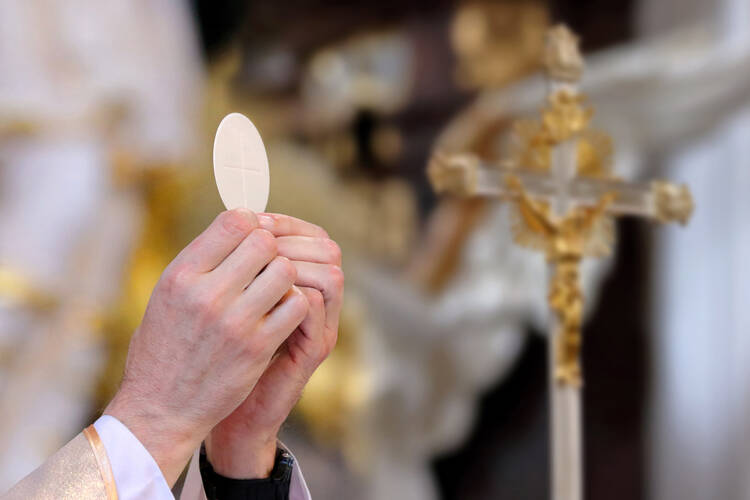IANACL*, but...
To really understand this story, you have to ask a couple of questions that no one here has thought of, yet. First, why might someone be ineligible to receive communion in the first place, and second, when should a priest who has this knowledge act on it by actually denying communion?
The answer to the first one is that there are several reasons. For example, I'm ineligible because I'm not baptized. Marvin is ineligible because, even though baptized, he's not a Catholic. Others are ineligible if they have been formally excommunicated. Others are ineligible if they are aware that they are not in a state of grace because of unrepented mortal sin. In other words, there are quite a few people who are not technically eligible. The particular reason that might apply to pro-choice politicians is this: one is ineligible if they persist in manifest grave sin. This means that they hard-headedly continue, knowingly, in grave sin that is generally known to the public.
To answer the second question, you first need to understand the purpose of preventing someone from taking communion. The church teaches that someone who is not properly disposed to partake does not receive the benefits of the eucharist, but in fact the act is spiritually detrimental and dangerous to them. Knowingly taking communion while not eligible is itself a mortal sin. Denial of communion would not be intended as a punishment of some kind, but rather as a form of spiritual protection of the sinner; someone who conditions himself to accept the sacrament while not in a state of grace may eventually convince himself that he has no reason to correct his sin, and continue obstinately in it indefinitely, perhaps even to the loss of his own salvation.
Because of all this, in the vast majority of cases, the decision is left to the communicant. The priest may not deny communion, even if he has knowledge that someone is ineligible. The thinking behind this is that only God knows whether or not someone is in a state of grace, but after God, the person most likely to know the state of his soul is the sinner himself. A priest, for example, may know that a woman has gotten an abortion, but he may not know if she has repented shortly before approaching. If she has, then the priest is doing her a grave wrong in denying her communion. Nor should a priest, through denying communion, publicize a sin that was previously private, thus causing a scandal. Therefore, in most cases, a priest does not have the authority to deny communion to someone, even if that priest knows the person is ineligible.
An exception to this general rule, though, and the reason it's a problem for politicians, is when the ineligibility is known. In this case, there is no longer a concern that publicizing the sin might cause a scandal. Just the opposite, in fact; allowing the person to take communion may itself cause a scandal.
The public knowledge of the sin changes everything. A priest must administer to someone who has been automatically (by action of canon law), but not publicly, excommunicated. But he cannot administer to someone who has been publicly excommunicated by a proper church authority. Similarly, while a priest cannot expose private sins through public denial of communion, he must deny communion in those cases where the grave sin is "manifest," i.e., widely known.
It is this last exception that may or may not apply to Biden. The Vatican has said that politicians who continually support permissive abortion policy without repentance are in a state of grave sin, and their pastor should privately point out to them the error of their ways, and if they refuse to change, then, and only then, communion should be denied. However, the USCCB has said - and the Vatican has agreed that their interpretation is valid - that each politician must be examined on a case-by-case basis, and the decision left up to the prudence of the individual bishop as to whether a particular politician's policy views and acts constitute manifest grave sin, therefore requiring private reproof followed by public denial if the reproof fails to gain repentance. They also left it to each individual bishop to determine whether it is even appropriate to use this pastoral tool when the only potential sin is one of an immoral political ideology. A majority of United States bishops do not allow denial of communion for this particular reason within their diocese.
The SC priest is therefore on shaky ground if he did not know for a fact that 1) Biden was already privately rebuked and refused to change his ways, and 2) that Biden's bishop determined that Biden was, in fact, continuing in manifest grave sin, and 3) that the priest's own Bishop is one of the bishops who permits denial in these particular cases in his diocese. I assume he has #3 covered, but the first two might be iffy.
Edited to add: The fact that the priest responded to an inquiry about this with anything other than "That's a private pastoral matter, and I'm not going to talk about it" doesn't speak well to the priest's motives, IMHO.
Edited to add more: I didn't realize that Biden's own bishop had already ruled in 2008 that he was ineligible. With that new knowledge, it appears the priest in question here was on legally solid ground, his sketchy response to the media on the matter notwithstanding.
* I Am Not A Canon Lawyer

